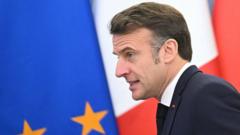Despite being two years into his second term, Macron's administration is now in search of a new direction to avoid the fate of Barnier’s short-lived tenure, which lasted only three months. Barnier’s government faced expulsion as a result of a coalition between left-leaning MPs and Le Pen’s National Rally, which opposed Macron's proposals for expansive tax cuts and increased spending aimed at reducing a budget deficit projected to reach 6.1% of GDP this year.
Ahead of the anticipated announcement on Thursday evening, speculation surrounds a possible replacement, with contenders including centrist MoDem leader François Bayrou, Defence Minister Sebastien Lecornu, and former centre-left Prime Minister Bernard Cazeneuve. A spokesperson for Barnier’s team indicated that Macron might look to include centre-left elements in his government or negotiate a non-aggression pact with them to prevent a repeat of the vote that ousted Barnier.
The current political system within France’s Fifth Republic allows the president to appoint a prime minister, who in turn selects their cabinet. Following unsatisfactory results in the EU elections, Macron had instigated snap parliamentary elections, resulting in a fragmented assembly with three key political blocs. Barnier was initially appointed to form a minority government reliant on the National Rally, but this alliance has now fallen apart, prompting Macron to seek a stable government without relying on far-right support.
The three centre-left parties—the Socialists, Greens, and Communists—are diverging from the more radical LFI and are prepared to engage in discussions to form a new administration. However, they firmly advocate for a left-leaning candidate to lead any proposed coalition. Greens leader Marine Tondelier articulated her concerns, indicating a preference for a candidate from the left over centrist nominees, illustrating the challenges Macron faces in uniting disparate factions.
Relations appear strained between the LFI and centre-left factions, with Mélenchon calling for a halt to coalition talks. Socialist leader Olivier Faure countered representing a moderate approach, dismissing Mélenchon’s reservations as ineffective. Meanwhile, Le Pen insists that her party’s economic priorities must be accommodated in any incoming government’s policy agenda, suggesting collaborative budget-making that respects each party's limitations.
As plans for the future government unfold, Barnier’s caretaker administration has proposed legislative measures to ensure continuity in budget provisions for the upcoming year, indicating that a new budget for 2025 will require parliamentary approval once the next cabinet is established.
Ahead of the anticipated announcement on Thursday evening, speculation surrounds a possible replacement, with contenders including centrist MoDem leader François Bayrou, Defence Minister Sebastien Lecornu, and former centre-left Prime Minister Bernard Cazeneuve. A spokesperson for Barnier’s team indicated that Macron might look to include centre-left elements in his government or negotiate a non-aggression pact with them to prevent a repeat of the vote that ousted Barnier.
The current political system within France’s Fifth Republic allows the president to appoint a prime minister, who in turn selects their cabinet. Following unsatisfactory results in the EU elections, Macron had instigated snap parliamentary elections, resulting in a fragmented assembly with three key political blocs. Barnier was initially appointed to form a minority government reliant on the National Rally, but this alliance has now fallen apart, prompting Macron to seek a stable government without relying on far-right support.
The three centre-left parties—the Socialists, Greens, and Communists—are diverging from the more radical LFI and are prepared to engage in discussions to form a new administration. However, they firmly advocate for a left-leaning candidate to lead any proposed coalition. Greens leader Marine Tondelier articulated her concerns, indicating a preference for a candidate from the left over centrist nominees, illustrating the challenges Macron faces in uniting disparate factions.
Relations appear strained between the LFI and centre-left factions, with Mélenchon calling for a halt to coalition talks. Socialist leader Olivier Faure countered representing a moderate approach, dismissing Mélenchon’s reservations as ineffective. Meanwhile, Le Pen insists that her party’s economic priorities must be accommodated in any incoming government’s policy agenda, suggesting collaborative budget-making that respects each party's limitations.
As plans for the future government unfold, Barnier’s caretaker administration has proposed legislative measures to ensure continuity in budget provisions for the upcoming year, indicating that a new budget for 2025 will require parliamentary approval once the next cabinet is established.



















